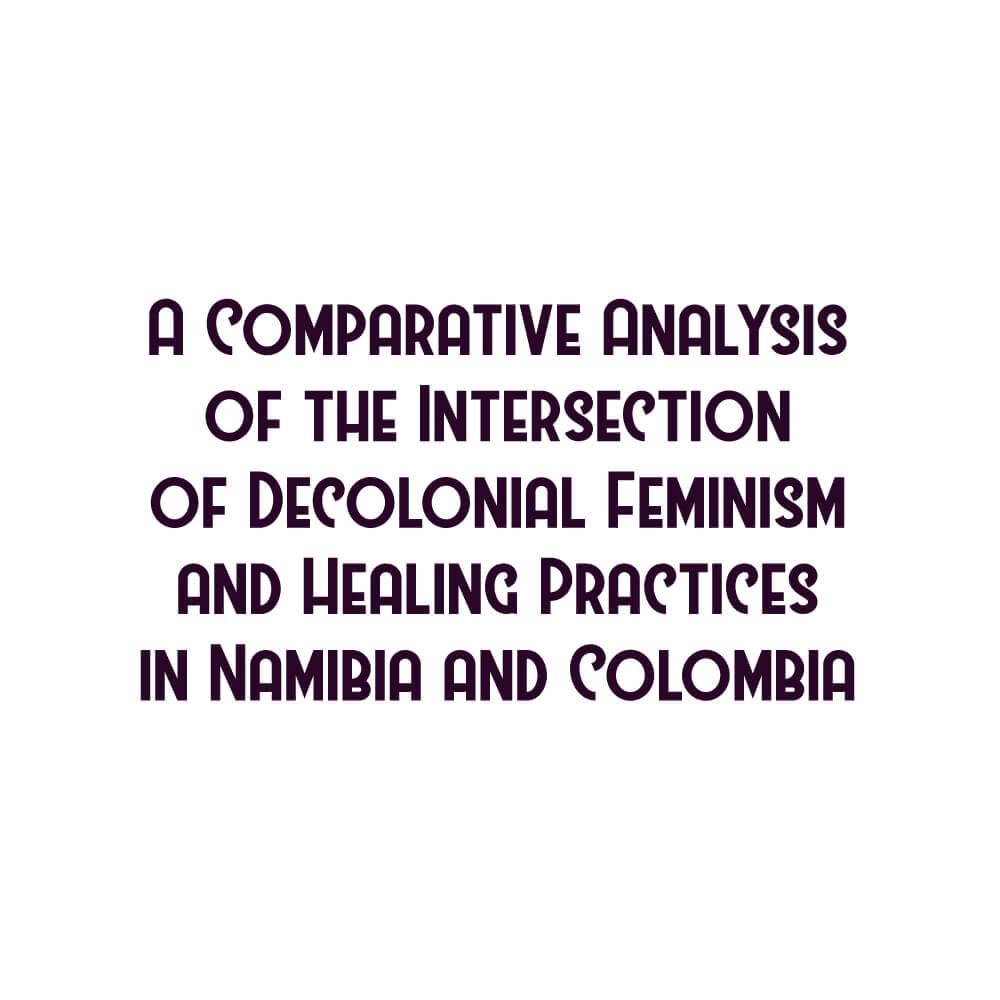Programmes

A Comparative Analysis of the Intersection of Decolonial Feminism and Healing Practices in Namibia and Colombia
Abstract
This project seeks to highlight the intersection between decolonial feminist strategies and reparations in the face of historical and ongoing injustices. There is an urgent need to address the barriers faced by communities in Colombia and Namibia by their specific historical legacies and peculiar cultural contexts. At the heart of this project is understanding how decolonial feminism can present and ameliorate gender biases and inequality in relation to reparations. Through participatory research involving local communities, healing practitioners and feminists, the study intends to examine the complexities of reparative justice and their intersection with decolonial feminism. The historical legacies of inequalities consequently position women, children and marginalised groups as the perpetual victims and survivors of global racism and social injustice. This project will build on existing research that highlights the imperative to address racial injustices in Namibia and Colombia. Dealing with trauma can be complex as trauma cannot be limited to an individual struggle, as it is necessary to engage trauma, woundedness, and healing through a collective and gendered/feminist social lens.
The cross-cultural analysis is influenced by the Healing Justice Framework underpinned by decolonial feminist analysis and knowledge production, which intentionally in method simultaneously focuses on colonial differences based on gender while humanising the oppressed and survivors of violence. Thus, decolonial feminism offers tools to move beyond the axis of power, which flows from colonial domination, and contemporary institutional arrangements that maintain the historical legacies of inequalities by situating women’s lived experiences within broader frames of global violence. Inherently, decolonial feminism builds on freedom dreams and the right to existence (to Being) against racism, capitalism and hetero-patriarchal imperialism. While reparation mechanisms are informed by competing underlying rationales that may affect how reparations programs are designed to allocate material and symbolic resources, there are legitimate reasons to inquire whether women or most women, would want to privilege one of these goals over others.
Organisational Profiles with Country Leads
Project Lead: CSVR
The Centre for the Study of Violence and Reconciliation (CSVR) is a multi-disciplinary non-profit organisation that offers a comprehensive approach to targeted research which informs community interventions, capacity building, and advocacy efforts at various levels. Established in 1989, CSVR has worked to uplift democracy by understanding violence, healing its effects, reconciling communities and building sustainable peace in South Africa, the continent and the global South. In partnership with civil society, affected communities, activists, and policy practitioners to ensure that states, private entities and global institutions are held accountable. CSVR's work is rooted in analysing and understanding the mutations of violence within societies to prevent future atrocities while dealing with the traumatic past of violence within shifting democratic regimes. CSVR’s mission is to promote sustainable peace by understanding, preventing and addressing the effects of violence and inequality. We consistently work vertically and horizontally across four thematic areas, namely transitional Justice, collective violence, gender-based violence and state-led violence.

Project Lead – CSVR (South Africa)
Nomancotsho Pakade is a South African-based researcher published in theoretical and experimental work on gender and sexuality, education and governance with extensive experience in community mobilisation and advocacy. She has acumen skills in qualitative and statistical analysis, including policy analysis, in-depth ethnography, and institutional studies. Nomancotsho holds an MA in Research Psychology from the University of Witwatersrand and is currently a PhD candidate at the Department of Historical and Heritage Studies at the University of Pretoria.
Partner: Young Feminist Movement Namibia
The Young Feminists Movement (Y-Fem) Namibia Trust is a feminist human rights organisation dedicated to advancing women’s human rights by promoting women’s access to health, education, and justice. Y-Fem Namibia Trust's aim is to build an inclusive and intersectional feminist movement of young women in Namibia who know and can claim their full human rights as persons as active citizens. Y-Fem was founded in Swakopmund, Namibia, In 2009 and registered in 2018. We are a national organisation focused on grassroots movements dedicated to advancing women’s human rights by promoting women’s bodily autonomy and integrity and consciousness-raising among young women of all forms of discrimination and oppression that have an impact on their lives and choices.

Country Lead Profile (Namibia)
Florence F. |Khaxas is passionate about lifelong learning, justice, diversity and inclusion, indigenous Healing knowledge documentation, Feminist Agroecology, women’s history, pleasure, and sexual rights. She is the founder and director of the Young Feminists movement (Y-Fem Namibia Trust), which is a feminist women's human rights organisation based in Windhoek which works to advance the rights of girls, young women and LBTIQ people through ICT, movement-building building and policy advocacy. She uses storytelling to advocate for Sexual rights and climate justice.
Partner: Dejusticia
Dejusticia is a Center for Legal and Social Studies dedicated to strengthening the rule of law and promoting human rights in Colombia and the Global South. We promote social change through rigorous studies and solid public policy proposals and conduct advocacy campaigns in high-impact forums. We also conduct strategic litigation and design and deliver educational and training programs.

Country Lead Profile (Colombia)
Paulo Bacca earned his Ph.D. in socio-legal studies from the University of Kent in the United Kingdom. His basic training occurred at the National University of Colombia, where he received a JD, an advanced degree in constitutional law, and an M.A. in philosophy of law. Paulo directed Dejusticia’s ethnic-racial justice line, was the human rights analyst of the National Indigenous Organization of Colombia (ONIC), and coordinated the freshwater preservation program of the Inter-American Association for Environmental Defense (AIDA). He currently works as deputy director.